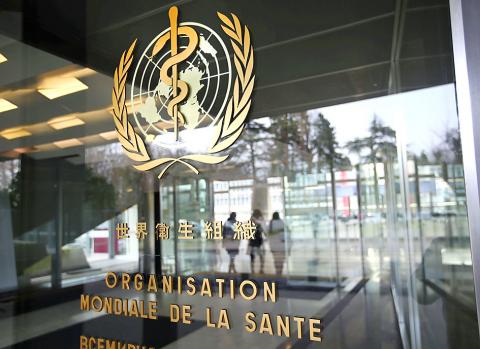The Australian Office Taipei yesterday joined other nations calling for Taiwan’s practical participation in the WHO, after representatives of the US, EU and Japan, as well as Taiwan’s diplomatic allies, spoke up for the nation at WHO executive board meetings in Geneva, Switzerland, this week.
“As the [2019] novel coronavirus [2019-nCoV] continues to underscore so starkly, diseases do not respect borders. In this interconnected and fast-moving world, it is clearly in all our interests that the WHO does not exclude populations or potential partners,” the office wrote on Facebook yesterday.
“Inclusivity has never been more important as we work together to manage this immediate global health emergency and, longer-term, to realize the world’s health-related sustainable development goals,” it wrote.

Photo: Reuters
The Canadian Trade Office in Taipei on Facebook shared Canadian Prime Minister Justin Trudeau’s support late last month for Taiwan’s role as a WHO observer.
The posts came after US Ambassador to the UN in Geneva Andrew Bremberg on Thursday urged the WHO to “engage directly with Taiwan public health authorities,” which prompted Chinese delegate Qi Dahai (齊大海) to reiterate Beijing’s claim that Taiwan is part of China, calling on attendees to stop “hyping up” the “so-called Taiwan issue.”
Since the daily meetings began on Monday, the delegates of eight of Taiwan’s diplomatic allies — Eswatini, Paraguay, Guatemala, Haiti, Honduras, Nauru, the Marshall Islands, and St Kitts and Nevis — have advocated Taiwan’s inclusion at the WHO to close global disease prevention loopholes.
They have been joined by delegates from the US, Japan, Germany (representing the EU), the UK, Australia, New Zealand and Belgium, which is very stimulating, the Ministry of Foreign Affairs said in a statement on Thursday.
The number and strength of foreign delegates speaking up for Taiwan has grown significantly, showing that the nation’s bid to join the WHO has secured general support from the global community, the ministry said.
Most of the foreign delegates voiced their support for Taiwan during discussions about public health emergencies, demonstrating the global community’s concern about the rapid spread of 2019-nCoV in China, and distrust over claims that Beijing and the WHO have fully cooperated with Taiwan on information about the outbreak, it said.
Minister of Foreign Affairs Joseph Wu (吳釗燮) on Thursday on Twitter called on WHO Director-General Tedros Adhanom Ghebreyesus to reconsider his statement praising China’s disease-prevention efforts, after Wu’s previous post highlighting the WHO’s misreporting of Taiwan’s confirmed cases and its reference to the nation using incorrect titles in its situation reports.
“One week ago, @DrTedros, you said: ‘China is setting a new standard for outbreak response.’ ‘China deserves our gratitude & respect.’ ‘I will praise China again & again.’ Are you going to stand by your statements or retract them? Hello?” Wu wrote.

INVESTIGATION: The case is the latest instance of a DPP figure being implicated in an espionage network accused of allegedly leaking information to Chinese intelligence Democratic Progressive Party (DPP) member Ho Jen-chieh (何仁傑) was detained and held incommunicado yesterday on suspicion of spying for China during his tenure as assistant to then-minister of foreign affairs Joseph Wu (吳釗燮). The Taipei District Prosecutors’ Office said Ho was implicated during its investigation into alleged spying activities by former Presidential Office consultant Wu Shang-yu (吳尚雨). Prosecutors said there is reason to believe Ho breached the National Security Act (國家安全法) by leaking classified Ministry of Foreign Affairs information to Chinese intelligence. Following interrogation, prosecutors petitioned the Taipei District Court to detain Ho, citing concerns over potential collusion or tampering of evidence. The

‘FORM OF PROTEST’: The German Institute Taipei said it was ‘shocked’ to see Nazi symbolism used in connection with political aims as it condemned the incident Sung Chien-liang (宋建樑), who led efforts to recall Democratic Progressive Party (DPP) Legislator Lee Kun-cheng (李坤城), was released on bail of NT$80,000 yesterday amid an outcry over a Nazi armband he wore to questioning the night before. Sung arrived at the New Taipei City District Prosecutors’ Office for questioning in a recall petition forgery case on Tuesday night wearing a red armband bearing a swastika, carrying a copy of Adolf Hitler’s Mein Kampf and giving a Nazi salute. Sung left the building at 1:15am without the armband and apparently covering the book with a coat. This is a serious international scandal and Chinese

Seventy percent of middle and elementary schools now conduct English classes entirely in English, the Ministry of Education said, as it encourages schools nationwide to adopt this practice Minister of Education (MOE) Cheng Ying-yao (鄭英耀) is scheduled to present a report on the government’s bilingual education policy to the Legislative Yuan’s Education and Culture Committee today. The report would outline strategies aimed at expanding access to education, reducing regional disparities and improving talent cultivation. Implementation of bilingual education policies has varied across local governments, occasionally drawing public criticism. For example, some schools have required teachers of non-English subjects to pass English proficiency

TRADE: The premier pledged safeguards on ‘Made in Taiwan’ labeling, anti-dumping measures and stricter export controls to strengthen its position in trade talks Products labeled “made in Taiwan” must be genuinely made in Taiwan, Premier Cho Jung-tai (卓榮泰) said yesterday, vowing to enforce strict safeguards against “origin laundering” and initiate anti-dumping investigations to prevent China dumping its products in Taiwan. Cho made the remarks in a discussion session with representatives from industries in Kaohsiung. In response to the US government’s recent announcement of “reciprocal” tariffs on its trading partners, President William Lai (賴清德) and Cho last week began a series of consultations with industry leaders nationwide to gather feedback and address concerns. Taiwanese and US officials held a videoconference on Friday evening to discuss the